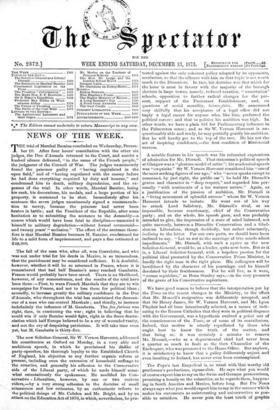A notable feature in his speech was his reiterated expressions
of admiration for Mr. Disraeli. That statesman's political speech at Glasgow was a "glorious model of satire"; his academical speech was "exquisite." Sir W. Vernon Harcourt considered him "one of the most striking figures of our age," who " never speaks except to command, by just right, the public ear "; he held Mr. Disraeli's genius and character in "deep respect," and regarded him per- sonally "with sentiments of a far warmer nature." Again, as a justification of the passion of ambition, Mr. Disraeli is a "living monument of splendid success" whom Sir W. Vernon Harcourt intends to imitate. He went out of his way to attack Lord Salisbury, Mr. Disraeli's rival, as an impossible, because reactionary, chief of the Conservative party ; and on the whole, his speeoh gave, and was probably intended to give, the impression of a state of mind balanced, not quite unevenly, between a Disraelite Conservatism and a Glad- 8ton:en Liberalism, though decidedly, but rather reluctantly, inclining to the latter. For our own parts, we should have been inclined to say, "Let us not to the marriage of true minds admit impediments." Mr. Disraeli, with such a squire as the new Solicitor-General, would be, as a leader, quite new-born. But as it is, a Liberal Solicitor-General, with a hopeless passion for the political ideal presented by the Conservative Prime Minister, is hardly the right man in the right place. His colleagues will be bewildered by the character of his yearnings, and he himself desolated by their fruitlessness. For he will live, as it were, " coram sepulchro," as Dean Stanley says,—in the very presence of the grave of his Conservative aspirations.










































